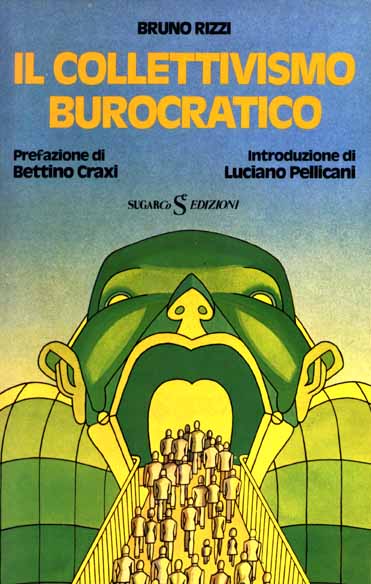"il
Giorno", Friday February 16th , 1990
Tomorrow, Mantova celebrates Bruno Rizzi, called the "Italian Gilas", thanks to his studies on the Soviet Union.
A TALENTED AUTODIDACT AT WAR WITH THE "BUREAUSAURS"
He was the first to assume that the Bolshevik revolution did not create Socialism but a society dominated by bureaucracy.
By LUCIANO PELLICANI
Tomorrow, a study congress will be held in Mantova relating to the figure of BrunoRizzi, a talented autodidact who, during his life, had intellectual interlocutors as Lev Trockij, Isaac Deutscher, Pierre Naville and Walter Kendall, but was almost completely ignored in Italy.
Rizzi attired the attention of the above mentioned scholars thanks to a book which was published in 1939 in Paris with the significant title: The Bureaucratic Collectivism


in which he assumed that the Bolshevik revolution did not establish socialism, but a “sui generis” society which has to bear the hegemony of a “new class”: bureaucracy. It is for this reason that he was defined the “Italian Gilas”, by the few who read his books.
In fact, in the famous work by Gilas, THE NEW CLASS, there is anything new from what Rizzi had said in great advance. Thus, Rizzi has not been a follower but a forerunner. Unfortunately, since he was an activist of the Quarta Internazionale (N.d.T.: The Fourth International, a political movement),
in order to avoid the severity of the Fascist dictatorship, he signed his book with the name of “Bruno R.”. Trockij, who was in Mexico City at that time, read his book and had a very good impression, in fact, his latest articles are full of references to the “mysterious Bruno R.”. But also James Burnham read it and misappropriated its basic idea and, without citing the inspiring source, wrote a book, THE MANAGERIAL REVOLUTION, thanks to which he became famous all over the world.
Vainly, the trockijist Pierre Naville, reported the shameful plagiarism of Burnham and the identity of the “mysterious Bruno R.”. Rizzi continued to be an outcast scholar who printed his books at his expenses and distributed them personally, since no Italian editor considered them worthy to be published. Some magazines, such as “Critica Sociale”, “Terzo Mondo”, “Giovane Critica”, “Rassegna Italiana di Sociologia” (N.d.T: Social Critique, Third World, Young Critique, Italian Sociology Report) published his articles and certain scholars, such as Giorgio Galli, Umberto Melotti, Antonio Carlo, Danilo Zolo, paid their attention to his bureaucratic collectivism theory. But this was all. Rizzi died in 1977, almost unknown and without the satisfaction to see his greatest work published by SugarCo, with an introduction by Bettino Craxi. He called me few days before his death and asked me to accelerate the publication of the BUREAUCRATIC COLLECTIVISM and thanked me for what I was doing in order to make his work be known by the Italian people. This is, briefly, the incredible adventure of the “Italian Gilas” who is going to be celebrated in Mantova as one of its best men on February 17th: a posthumous but right and proper compensation to a passionate scholar who found out, with extreme clearness, the biggest evil of the century: the totalitarianism in its double feature of Communist and Nazi revolution.


It also takes into consideration the basic idea which brought him to understand the real nature of what many scholars, who defined themselves progressists, have considered many years before as “the motherland of socialism”.
This idea can be resumed as follows: the collective property of the means of production does not eliminate the classes and the exploitation of one man on the other, but creates a new class and a new form of exploitation, even more unmerciful of the one which characterize the capitalistic way of production: it does it by suppressing the market and, with it, the autonomy of the civil society as regards the State. The result is that the State, which is the only employer, becomes omnipotent and transforms the direct producers into “slaves of bureaucracy”.
Today, this truth, after the global failure of the Marxist-Leninist Communism, is almost obvious. But, when Rizzi explained this idea in its innumerable articles, he obtained only commentaries full of arrogance by our intellectuals, who were blind and deaf as regards reality, and arrogantly convinced that the economical collectivism was “the solved enigma of history”.
.................................................................................. ...............................................................................
...............................................................................




